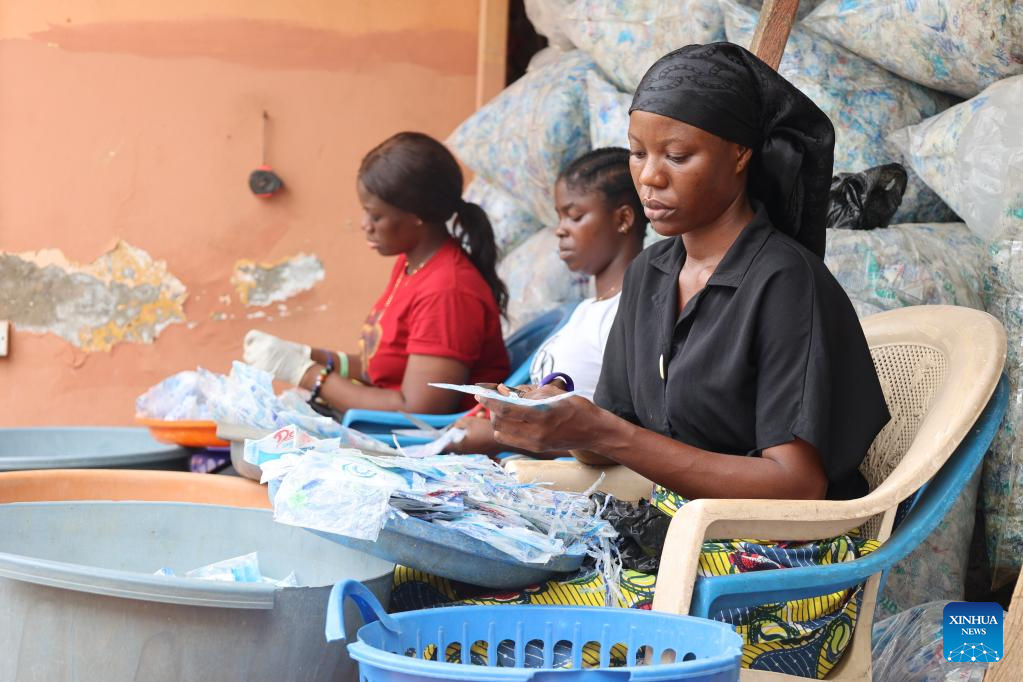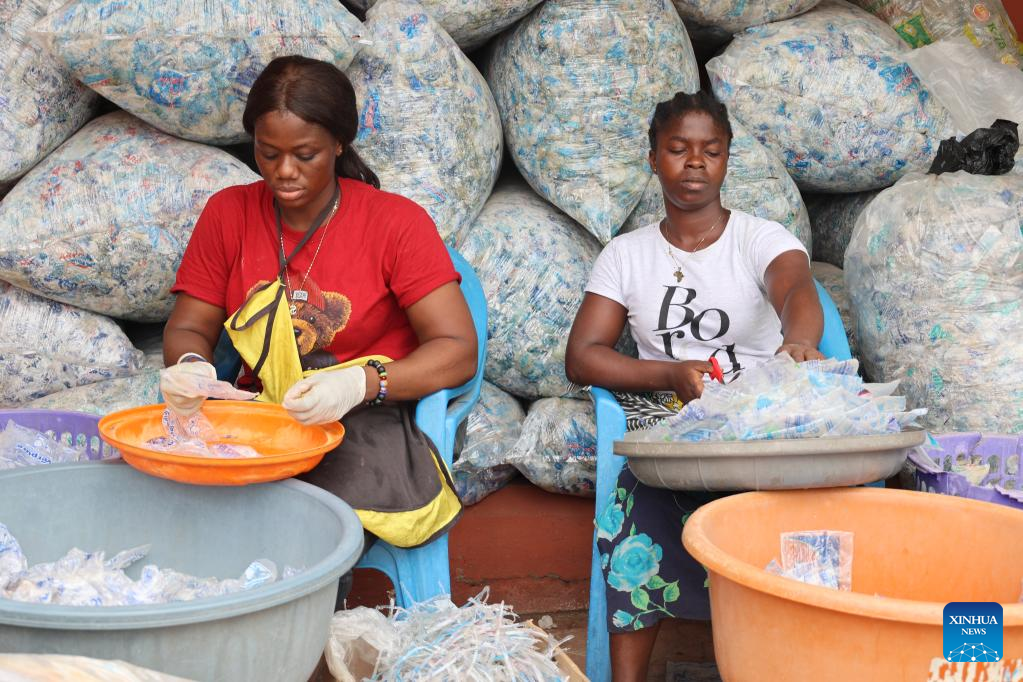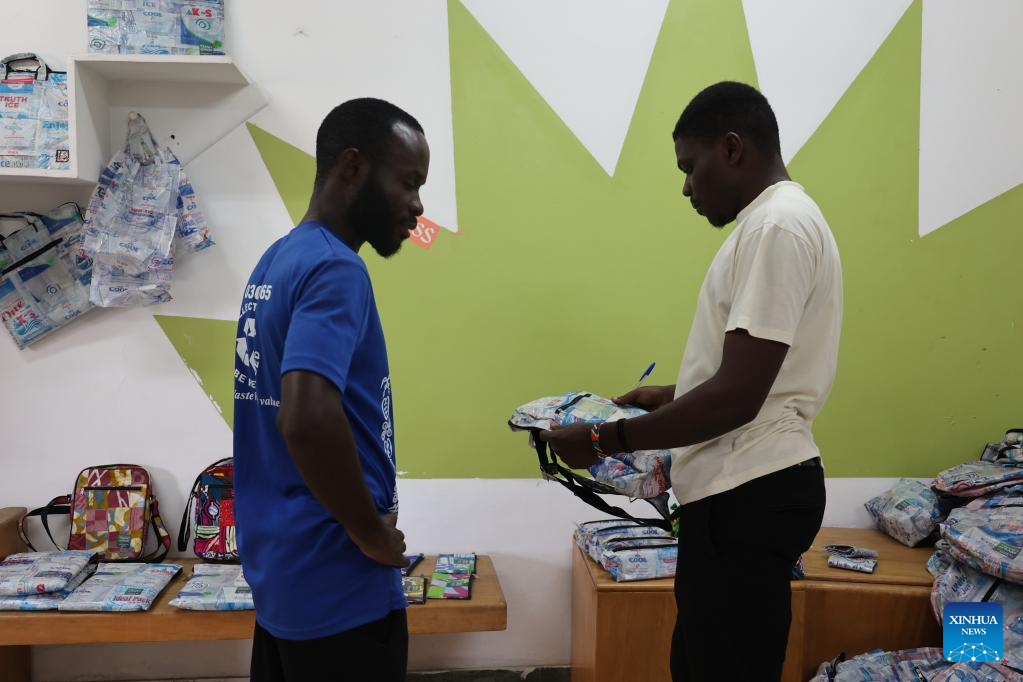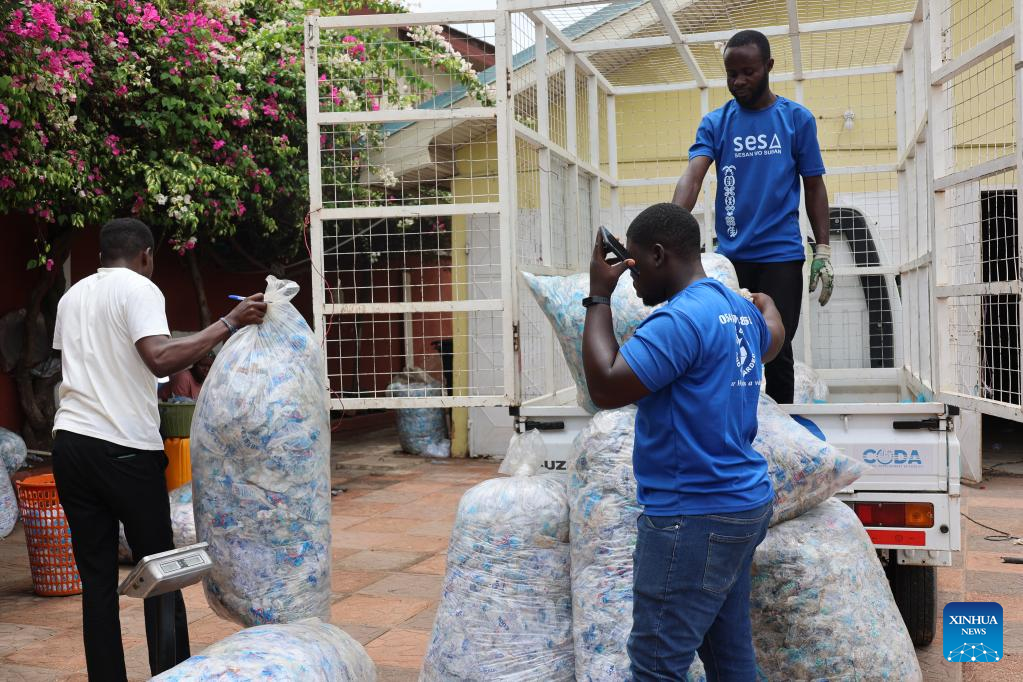
Workers sort out plastic bags at a recycling factory in Accra, Ghana, on April 17, 2023. As the world grapples with the plastic waste menace, a Ghanaian company has developed a simple means of turning this nuisance into valuable products while cleaning up the city. (Photo by Seth/Xinhua)
ACCRA, April 21 (Xinhua) -- As the world grapples with the plastic waste menace, a Ghanaian company has developed a simple means of turning this nuisance into valuable products while cleaning up the city.
Trashy Bags, a local waste recycling company in Dzorwulu, a suburb of Accra, the Ghanaian capital, produces different types of bags from used plastics.
In the company's showroom, there are different trendy bags, including laptop bags, shopping bags, traveling bags, school bags, vanity cases, backpacks, gym bags, purses, and wallets for everyday use, made from used plastics gathered from the streets and households.
Elvis Aboluah, the company's project director, said Trashy Bags is a social enterprise into manufacturing through recycling and upcycling products both for local use and export, noting it mainly focuses on devising sustainable ways of ridding Ghana of the plastic waste menace.
"Plastic waste is a huge threat to nature, not only in Ghana, but it has become a global problem that seriously affects the environment, the ocean, landfills, and impacts agriculture and livelihoods of animals and humans negatively," said Aboluah. "We need to get on top of the challenge through recycling to arrest the massive volumes of these plastics that find their way into different parts of the environment."
The company's recycling idea originated from small plastic sachet bags that contain drinking water, the most common way for local people to quench their thirst. In the meantime, large quantities of abandoned bags scattered along the city streets have also become a common sight.
Aboluah said the company had been operating for 15 years, deploying various modules to deal with the plastic waste menace bedeviling the West African country.
He said one of the factors driving the project was giving people a reason to collect used plastics from the streets and homes to help keep the country clean. "Once there is value for it, people are willing to collect used plastics."
"We collaborate with schools, institutions, and members of the surrounding communities who collect used plastics and sell to us for some income," he told Xinhua.
After buying the used plastic from the collectors, the 30 employees of Trashy Bags swing into action, cutting open these plastic bags and washing them thoroughly of filth, debris, and other forms of waste. The workers sun-dry the materials before moving them back into the main factory for production.
"At this stage, we distribute the materials to the individual workers to make different components of bags, depending on what we are manufacturing at the time. Each worker makes bits and pieces of a particular product. In the end, we put all that together at the final stage for the finished products," he said.
A large part of the products from Trashy Bags is school bags and other bags people need for their educational activities.
"It is not as easy changing the attitude of adults, but education is key to effecting change. We involve schools in the collection of used plastics, while we also produce school bags for school children, and that strategy is making an impact in terms of inducing the needed change in attitudes," he stated.
With the support of some charity, he said the company hoped to distribute at least 10,000 school bags to different schools in different parts of Ghana and hopefully in the neighboring countries this year to help the students in impoverished areas.
Aboluah noted that in that regard, the company still needed support from other corporate organizations to help expand the work and deepen the impact of keeping the country clean.
He said the company had made a positive environmental impact after recycling over 13 million pieces of used plastics, using that to create awareness among its users in and outside Ghana.
Aboluah added that 90 percent of the company's 30 employees are female, including young mothers who would otherwise have been unemployed.
He was glad that people from developed countries patronize the Trashy Bags as their contribution to the efforts helps sustain the ecosystem, and Ghanaians also see it as their civic responsibility to keep the streets and the drains clean and free of plastic waste.
"People love the bags, and if we get more funding and subsidies, we can donate some of the smart bags to communities and schools and place some at the malls as shopping bags, so we can get rid of the single-use plastic bags and adopt these reusable bags," he added.
According to official data from the United Nations Development Program (UNDP), Ghana generates 12,710 metric tons of solid waste daily, and only 10 percent of that is collected and disposed of properly.
"Plastic waste constitutes a large proportion of urban waste, and there is the need for effective and integrated solid waste management systems that respond to the complex demands of cities," said the UNDP in a report on Ghana last year. In the past few years, Ghana has seen a few enterprises of different scales coming up in the recycling area like Trashy Bags to contribute to building a cleaner country. ■

Workers sort out plastic bags at a recycling factory in Accra, Ghana, on April 17, 2023. As the world grapples with the plastic waste menace, a Ghanaian company has developed a simple means of turning this nuisance into valuable products while cleaning up the city. (Photo by Seth/Xinhua)

A man looks at a bag at a show room of a recycling factory in Accra, Ghana, on April 17, 2023. As the world grapples with the plastic waste menace, a Ghanaian company has developed a simple means of turning this nuisance into valuable products while cleaning up the city. (Photo by Seth/Xinhua)

Workers load plastic bags at a recycling factory in Accra, Ghana, on April 17, 2023. As the world grapples with the plastic waste menace, a Ghanaian company has developed a simple means of turning this nuisance into valuable products while cleaning up the city. (Photo by Seth/Xinhua)



